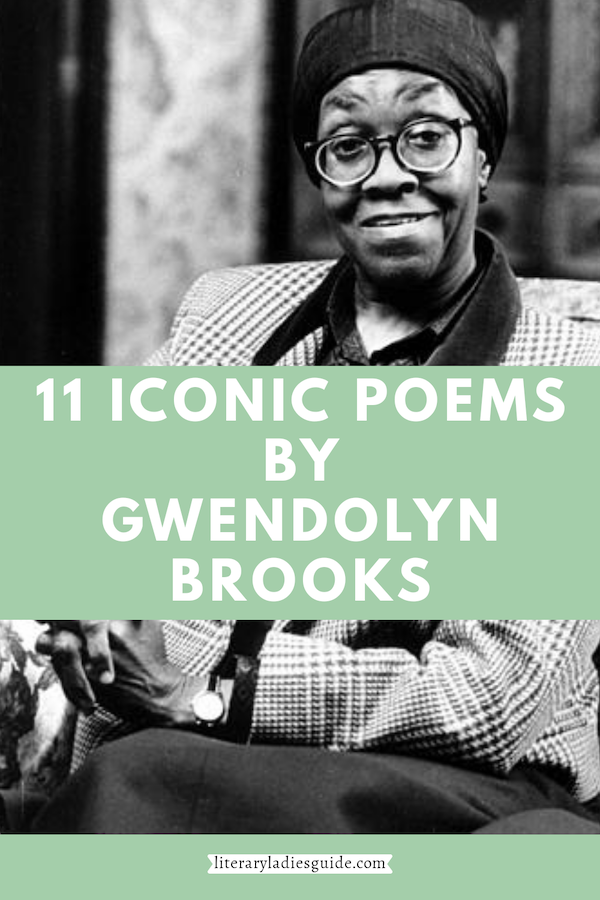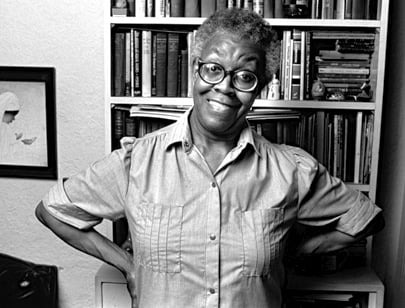11 Iconic Poems by Gwendolyn Brooks
By Taylor Jasmine | On February 1, 2020 | Updated September 2, 2022 | Comments (5)

Gwendolyn Brooks (1917 – 2000) sustained a decades-long career as a poet, and was recognized with many honors, including the Pulitzer Prize, during her lifetime. Following is a sampling of the first few lines of classic poems by Gwendolyn Brooks, with links to the full texts and analyses following each.
This selection doesn’t claim to be the absolutely most representative of her poems, as that would be a tough call — so much of her work is part of the American literary canon.
Brooks’s poetic work included sonnets, ballads, and blues rhythm in free verse. She also created lyrical poems, some of which were book-length.
Here are the poems for which you’ll find the start of in this roundup. You’ll also find a link to an analysis following each poem.
- The Children of the Poor
- The Mother
- We Real Cool
- To be in Love
- Sadie and Maud
- A Sunset of the City
- Boy Breaking Glass
- The Bean Eaters
- Jessie Mitchell’s Mother
- A Song in the Front Yard
- kitchenette building
Reflecting African-American life
Much of her poetry reflected on urban African-American life, though its themes were universal to the human experience. Her output was impressive, encompassing more than twenty books, including children’s books.
Brooks broke into book publishing in 1945 with A Street In Bronzeville, referring to an area in the Chicago’s South Side. It was an auspicious beginning, as this poetry collection led to her winning a Guggenheim Fellowship.
The epic, book-length poem Annie Allen (1949) earned Brooks a Pulitzer Prize in 1950, making her the first African-American to win this award.
In her storied career, Brooks was Poet Laureate for the state of Illinois, Consultant in Poetry to the Library of Congress, and taught at several prominent universities. But what she’s remembered for most was this skill with which she used her poetic voice to spread tolerance and understanding the black experience in America.
. . . . . . . . . . .

More about Gwendolyn Brooks
. . . . . . . . . .
The Children of the Poor
1
People who have no children can be hard:
Attain a mail of ice and insolence:
Need not pause in the fire, and in no sense
Hesitate in the hurricane to guard.
And when wide world is bitten and bewarred
They perish purely, waving their spirits hence
Without a trace of grace or of offense
To laugh or fail, diffident, wonder-starred …
Full text of “The Children of the Poor”
Analysis of “The Children of the Poor”
. . . . . . . . . .
The Mother
Abortions will not let you forget.
You remember the children you got that you did not get,
The damp small pulps with a little or with no hair,
The singers and workers that never handled the air.
You will never neglect or beat
Them, or silence or buy with a sweet.
You will never wind up the sucking-thumb
Or scuttle off ghosts that come …
(from Blacks, 1987)
. . . . . . . . . .
We Real Cool
The Pool Players.
Seven at the Golden Shovel.
We real cool. We
Left school. We
Lurk late …
(from The Bean Eaters, 1960)
. . . . . . . . . . .
To Be in Love
To be in love
Is to touch with a lighter hand.
In yourself you stretch, you are well.
You look at things
Through his eyes.
A cardinal is red.
A sky is blue.
Suddenly you know he knows too …
. . . . . . . . . .
 . . . . . . . . . .
. . . . . . . . . .
Sadie and Maud
Maud went to college.
Sadie stayed home.
Sadie scraped life
With a fine toothed comb.
She didn’t leave a tangle in
Her comb found every strand.
Sadie was one of the livingest chicks
In all the land …
(from Selected Poems , Harper & Row, 1963)
. . . . . . . . . . .
A Sunset of the City
Already I am no longer looked at with lechery or love.
My daughters and sons have put me away with marbles and dolls,
Are gone from the house.
My husband and lovers are pleasant or somewhat polite
And night is night.
It is a real chill out,
The genuine thing …
(from Selected Poems , Harper & Row, 1963)
. . . . . . . . . .
Boy Breaking Glass
Whose broken window is a cry of art
(success, that winks aware
as elegance, as a treasonable faith)
is raw: is sonic: is old-eyed première.
Our beautiful flaw and terrible ornament.
Our barbarous and metal little man …
(from Blacks, Third World Press, 1987)
. . . . . . . . . . . .
The Bean Eaters
They eat beans mostly, this old yellow pair.
Dinner is a casual affair.
Plain chipware on a plain and creaking wood,
Tin flatware.
Two who are Mostly Good …
(from The Bean Eaters, 1960)
. . . . . . . . . . .

Gwendolyn Brooks Quotes on Writing and Life
. . . . . . . . . . .
Jessie Mitchell’s Mother
Into her mother’s bedroom to wash the ballooning body.
“My mother is jelly-hearted and she has a brain of jelly:
Sweet, quiver-soft, irrelevant. Not essential.
Only a habit would cry if she should die.
A pleasant sort of fool without the least iron. . . .
Are you better, mother, do you think it will come today?
(from Selected Poems, Harper & Row, 1963)
. . . . . . . . . . .

Poetic Quotes from Maud Martha by Gwendolyn Brooks
A Song in the Front Yard
I’ve stayed in the front yard all my life.
I want a peek at the back
Where it’s rough and untended and hungry weed grows.
A girl gets sick of a rose.
I want to go in the back yard now
And maybe down the alley,
To where the charity children play.
I want a good time today.
(from Selected Poems, 1963)
. . . . . . . . . . .
kitchenette building
We are things of dry hours and the involuntary plan,
Grayed in, and gray. “Dream” makes a giddy sound, not strong
Like “rent,” “feeding a wife,” “satisfying a man.”
But could a dream send up through onion fumes
Its white and violet, fight with fried potatoes …
(from Selected Poems, Harper & Row, 1963)
I am so pleased to be introduced to this poet. I will definitely be reading more of her thoughts ideas about life
Pamela — yes, she was an amazing poet. I regret I can’t reprint her full poems here due to copyright restrictions; so it’s best to find a book of her poetry and peruse leisurely!
Awesome its really very useful for English literature students
Are these poems in the public domain? I might like to use them on library facebook.
Christine, these aren’t in the public domain, but since they’re all over the internet, I felt safe using them.